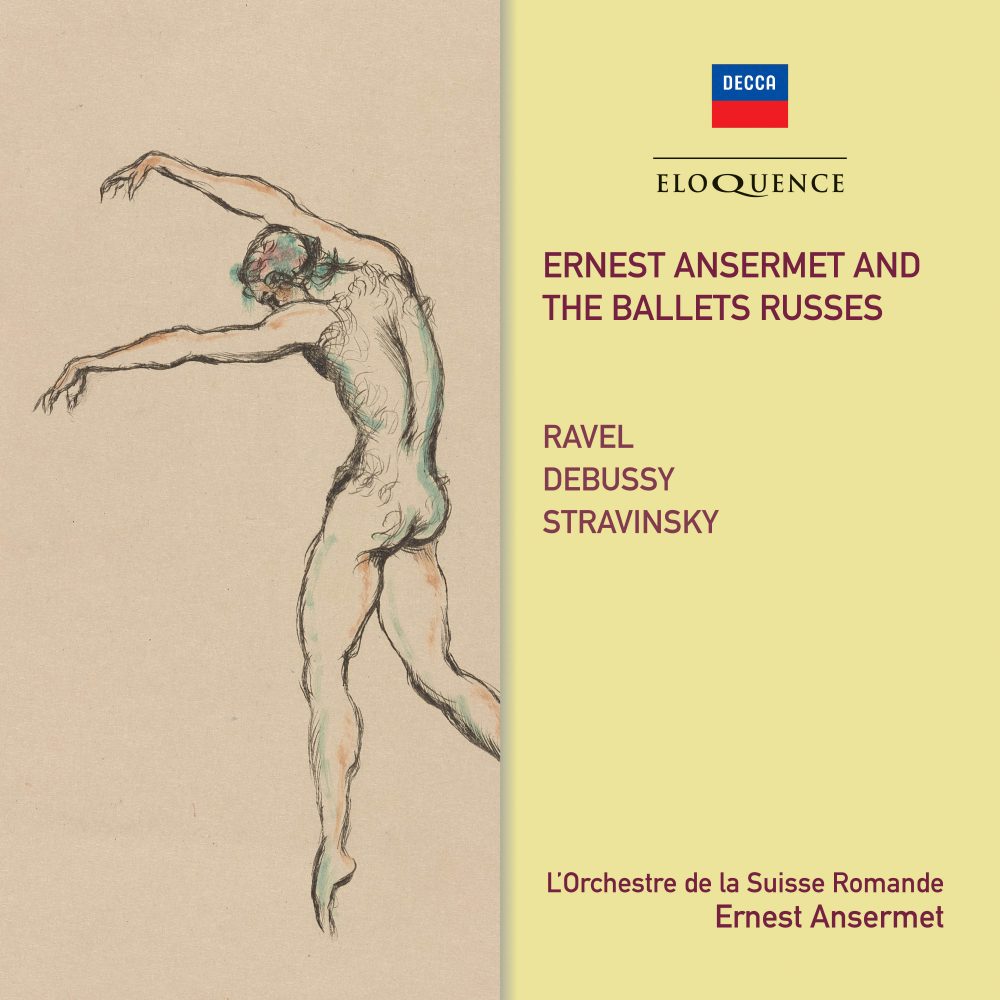A generous collection of classic Decca stereo recordings, illuminating the idiomatic sympathy of the Swiss conductor, Ernest Ansermet, for ballet music and specifically the scores commissioned by Serge Diaghilev for the Ballets Russes.
The Eloquence label has undertaken a thorough-going re-examination of the recorded legacy of Ernest Ansermet, including reissues of repertoire with which he is no longer associated such as symphonies by Schumann (480 0078), Sibelius (480 0044) and Prokofiev (480 0834). His Beethoven (480 0391) has always been admired for its thrilling energy and sure sense of direction; nevertheless, it was on the music of French, and French-accented Russian composers that his reputation was most securely founded. A 4CD set catalogues his first recordings of important works by Stravinsky (480 3775) along with his mono recordings of Debussy (480 0127) and Ravel (442 8321).
Now for the first time Ansermet’s later stereo recordings of Diaghilev ballets are brought together on a generously filled 2CD set including the ‘Prélude à l’après-midi d’un faune’, ‘Jeux’, ‘Daphnis et Chloé’, ‘La Valse’, a complete ‘Pulcinella’ and ‘Les Noces’ (sung in French with a Swiss-French cast). A new booklet appreciation by François Hudry places into context Ansermet’s special understanding and inside knowledge of these scores and the Parisian milieu from which they sprang. Indeed, he had vivid memories of conducting the company on a tour of the US, including 105 performances in 105 days.
In 1909, when still a young man, Ansermet wrote that ‘Debussy’s work seems to me the most important musical phenomenon since Wagner and the Russians … His influence is neither to be wished nor feared, it cannot be avoided.’ Together with Ravel and Stravinsky, Debussy was the composer Ansermet conducted most and he took their music all over the world. ‘La valse’ in particular became a calling-card: In 1921, after listening to Ansermet conduct the work, Ravel immediately wrote to him: ‘You understand ‘La valse’ perfectly. I have never been able to obtain such rhythmic suppleness in Paris.’
CD 1
MAURICE RAVEL
Daphnis et Chloé (complete ballet)+
CLAUDE DEBUSSY
Prélude à l’après-midi d’un faune
Jeux (Poème dansé)
CD 2
IGOR STRAVINSKY
Pulcinella
Marilyn Tyler, soprano
Carlo Franzini, tenor
Boris Carmeli, bass
Les Noces
MAURICE RAVEL
La Valse
Les Chœurs de la Radio Suisse Romande+
L’Orchestre de la Suisse Romande
Ernest Ansermet
Recording Producers: John Mordler (Daphnis et Chloé, Pulcinella); James Walker (Prélude à l’après-midi d’un faune, Jeux); James Walker, Michael Bremner (Les Noces); Michael Bremner (La Valse)
Balance Engineers: James Lock, Colin Moorfoot (Daphnis et Chloé); Gil Went, Roy Wallace (Prélude à l’après-midi d’un faune); James Timms, Roy Wallace (Jeux); James Lock (Pulcinella); Karl Brugger, Roy Wallace (Les Noces); Roy Wallace (La Valse)
Recording Location: Victoria Hall, Geneva, Switzerland, 28 October 1957 (Prélude à l’après-midi d’un faune), 1–23 April 1958 (Jeux), 14–15 January 1961 (Les Noces); 2–8 April 1963 (La Valse); 10 April and 1–3, 6 & 9 May 1965 (Daphnis et Chloé); 2–4 November 1965 (Pulcinella)
Remastering Engineer: Chris Bernauer
Original Decca LP Releases: SXL 6204 (Daphnis et Chloé); LXT 5424 / SXL 2061 (Prélude à l’après-midi d’un faune); SXL 2027 (Jeux); SXL 6230 (Pulcinella) LXT 5639 / SXL 2777 (Les Noces); SXL 6065 (La Valse)
‘The recording of Les Noces is… extremely fine.’ High Fidelity
‘Ansermet… makes all other conductors seem a bit heavy and coarse by comparison’ Fanfare (Daphnis et Chloe)
‘Ansermet’s gorgeous stereo recording [is] a marvel of flexible pacing and atmosphere.’ Fanfare (Jeux)

